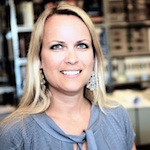It’s a point of pride for Georgia-based Southland Custom Homes that it is willing to build wherever its clients desire across the state. “We want to make a client’s dream home an affordable, positive, exciting experience; and we do that on their land,” district sales manager Robb Smith says. “On the land that they have grown up with, that they love, that’s been part of their family, or even something they are just now purchasing.” Many homebuilders can make a similar boast, but Southland Custom Homes has set itself apart over the past few years by working to make sustainability and energy efficiency standard on all its projects while still offering competitive pricing.
One of the staple products of Southland’s green push is ZIP System sheathing, an upgrade from traditional roofing felt and house wrap. ZIP System wall and roof sheathing combines structural wood paneling and a water-resistant barrier, providing moisture protection during and after the building process. It also creates an air barrier, which improves energy efficiency to help clients in the long term. “The ZIP System saves energy and money on costly fuel bills,” Smith says.
ZIP System sheathing is also less susceptible to wear and tear during construction, and it’s resistant to weather damage. Southland has used this relatively new material for three years and is one of the few builders in the state using it as a standard. “With Southland’s standard building processes, coupled with the ZIP System,” Smith says, “our custom-built homes are probably 50 percent better on air infiltration than a home built with standard house wrap and felt.”
Another signature material the company uses is AdvanTech floor sheathing, which is also designed for moisture resistance. “As you’re constructing a home and it’s open to the elements,” Smith says, “you go in the home, and you see water on the floor because it rained and the windows aren’t in.” AdvanTech sheathing is stronger than conventional options, and it’s guaranteed not to cup or warp under harsh weather conditions, which minimizes rework and combats squeaky floors for years.
For additional energy savings, Southland installs Energy Star appliances, high-efficiency water heaters, low-E insulated glass windows, insulated exterior doors, roof-venting systems, and fiberglass insulation. And, to conserve water, the company uses low-flow faucets and showerheads and ultra low-flow toilets.
Southland has stayed competitive statewide by offering these high-quality materials at a manageable cost. “We can meet or beat our potential competition in price alone and give [customers] these standard specifications,” Smith says.
To do this, though, requires the patient cultivation of close relationships with key allies. Fortunately, it’s a practice the firm has pursued from the beginning. “We lean on our vendors and subcontractors for assistance in pricing breaks,” Smith says. “They’re all willing to help out and pitch in like a family. Most of them have worked with us for years, and they all know they are going to have a job to go to tomorrow.” ABQ


